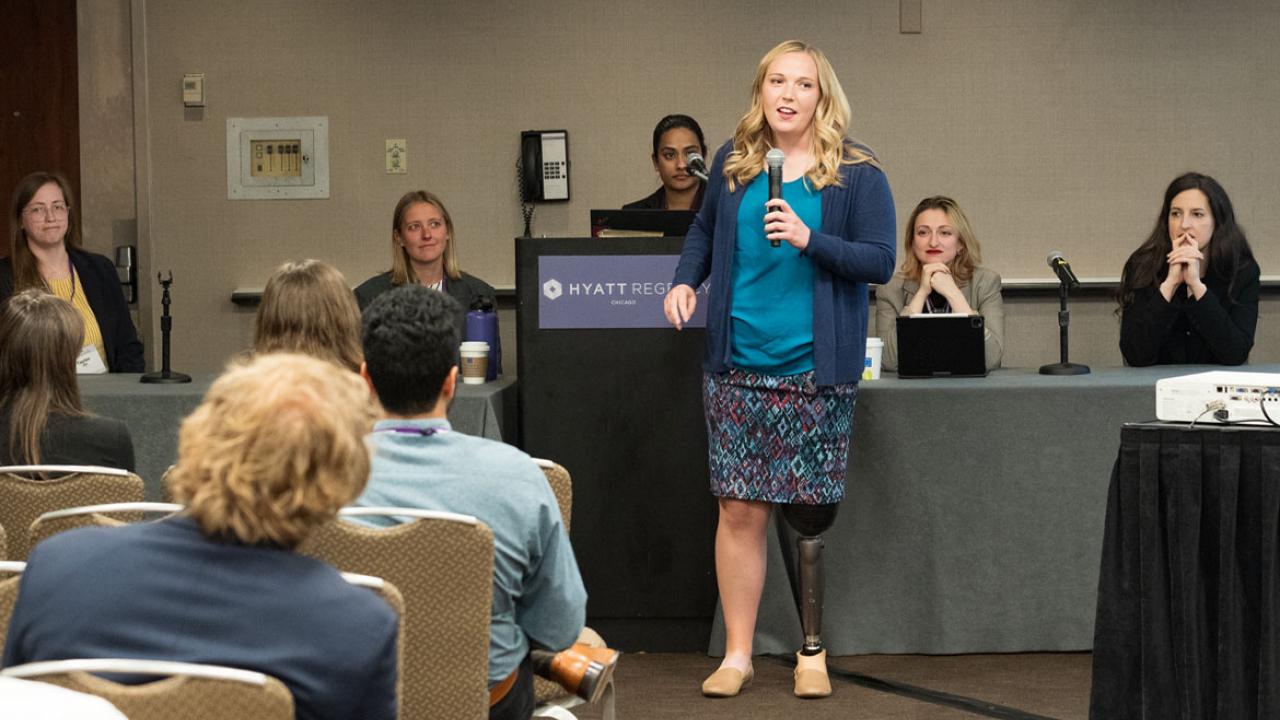Part of the effort to increase physician diversity includes removing barriers that people with disabilities face when pursuing a career in medicine.
However, while doctors and medical students become accustomed to treating patients with disabilities, they often feel anxious when interacting with colleagues and fellow students who also have disabilities.
It’s a hurdle that can be overcome, according to speakers at an educational session hosted by the AMA Medical Student Section.
“If you receive an accommodation and you’re not sure how to act, just ask,” says Davey Lunn, MD, MS, MPH, who has hearing loss and other disabilities.
“There’s no shame in having a disability,” says Dr. Lunn, an internal medicine resident at Montefiore Medical Center’s Einstein campus in the Bronx borough of New York City. “That means there’s no shame in asking them what it’s like to have a disability.”
Courtney Frantz, a third-year student at Texas Christian University’s Burnet College of Medicine, had her left leg amputated above the knee to treat a genetic disease she’s suffered from all her life. The amputation marks the 21st surgery she’s had on her leg.
“I want to be very clear: ‘disabled’ is not a dirty word and amputation is not a bad thing,” Franz said during a session during the AMA Annual Meeting in 2023. “Amputation has improved my life.”
When Franz’s parents saw her walk for the first time with her prosthetic leg, they cried with joy because they had not seen her walk so well in years.
“I’ve always been disabled, but I didn’t accept it,” Franz says. “People told me, ‘You’re not disabled. It’s a dirty word. We don’t call you that.’ But I was.”
Related Articles Three Keys to Treating People with Intellectual Disabilities
Disability means more work
Disability means more work
For Franz, accepting his disability means attending extra meetings to discuss mitigation strategies, but his supervisors don’t discuss the issue. During his training at the hospital, his classmates often suggest he take the stairs because the elevators are too crowded, overlooking the fact that the elevator is quicker if you’re missing a knee.
Taylor Hill, MD, an internal medicine resident at East Carolina University in Greenville, North Carolina, also had a below-knee amputation in a four-wheel drive accident at age 15. She said the experience inspired her to pursue medicine, a career she had never considered before, and the medical profession became a family affair, with two sisters becoming nurses and another working in health care administration.
“To say that was a seminal moment in our lives would be an understatement, but it’s what brought me here today,” Dr. Hill said. But even though he’s enrolled in the Transportation Security Administration’s PreCheck program, he still has some issues, especially at the airport.
“I don’t just take my shoes off, I take my pants off,” she said. “My whole leg has to be inspected before I get on the plane.”
That experience is part of a pattern.
“You spend a lot of time trying to prove that you belong there, but none of those places were made for you,” said Dr. Hill, who recalled being told she would “be a problem in med school” because she couldn’t run to perform CPR on a patient, even though that’s not something doctors typically do.
Coaching and Adaptation
Coaching and Adaptation
Despite being almost completely deaf in one ear since age 11, Heidi Ventresca, a third-year medical student at Louisiana State University Shreveport’s College of Health Sciences, has been named chair of the AMA’s medical student division.
“When I got to college, I didn’t realize how deaf I was,” Ventresca said. “I didn’t really think about it. In fact, I went to college to major in music.”
A clarinet performance major and classical musician, she played and rehearsed four to 12 hours a day, and her hearing loss became an issue when she was nearly kicked off the rowing team for “not being able to handle the instruction.”
“I had no idea she was talking to me or mentoring anyone on my ship,” Ventresca said. “Ironically, being semi-deaf as a music major was easier than being semi-deaf as a medicine major, which I didn’t expect.”
Related Article 5 Barriers Facing Medical Students and Residents with Disabilities
Dr Lunn noted that research shows the main reason why people with disabilities fail in medicine is due to a lack of mentoring, guidance and career advice.
“It’s not the disability itself that holds people back, it’s what holds them back,” Dr. Lunn said.
“The point I want to make here is that illness is not a disability, they are two different things,” Dr. Lunn added. “How you interact with the illness determines whether it is a disability or not.”
Connecting with patients
Connecting with patients
Franz noted that her disability helped her connect with patients when no one else could.
One man needed to have his leg amputated to save his life, but was hesitant to do so.
“I told my son, ‘You’re going to be joining a community of amazing people, and it’s going to look different than your life now, but it doesn’t mean you’re any less,'” Franz said. “‘Your feet don’t define who you are.'”
“This man had a total mental breakdown, and what nobody realized — the doctors and residents — was that this man was more afraid of losing his leg than he was of losing his life,” she recalled. “So you always have to ask yourself, ‘Who is this patient beyond their condition?'”

